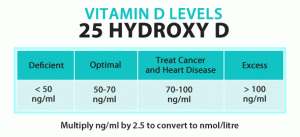According to a new study recently published in the British Medical Journal, evidence from clinical trials has found that Vitamin D supplements do not help prevent disease in most people.
From the article:
“In spring and summer in the far regions of the Northern and Southern Hemispheres, such as the northern US and New Zealand, people tend to produce enough vitamin D through sunlight on their skin and foods in their diet. The vitamin helps the body absorb calcium to promote bone growth.Getting enough vitamin D, calculated as 15 micrograms for ages 1 through 70 in the United States, also prevents rickets in children and osteomalacia — bone softening — in adults.” (There’s no way 15 micrograms, around 120 IU, is enough.)

“Failure to address low vitamin D status during childhood, adolescence, for women of childbearing age and in the elderly could have serious long-term implications for public health. Action is needed now in the face of growing evidence of a high prevalence of vitamin D insufficiency.”

- Vitamin D Deficiency During Pregnancy Raises Your Child’s Risk for Autism
- Vitamin D is Involved in the Biology of all Cells in Your Body, Including Your Immune Cells
- This Vitamin Deficiency Raises Your Risk of Depression up to 300 Percent
Do you get enough Vitamin D? Do you know your levels? Do you know the signs of Vitamin D deficiency: darker skin, feeling sad, obesity, being over 50 years old, your bones ache, head sweating and any gut troubles. These could all be symptoms of Vitamin D deficiency or something else, so it’s best to check with a physician.
Source: CNN












